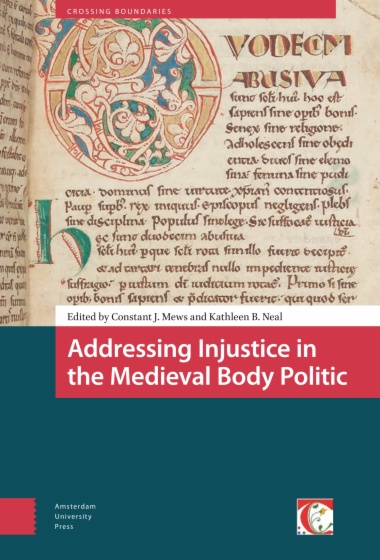ustice and injustice were subjects of ongoing debate in medieval Europe. Received classical and biblical models both influenced how these qualities of moral and political life were perceived, discussed and acted upon. Important among these influences was the anonymous seventh-century Irish text, On The Twelve Abuses of the Age, a biblically-inspired discussion of the moral duties particular to each sector of society. This volume probes its long influence, and its interaction with the revival of classical ideas. By bringing together scholars of political thought and practice, in lay and religious contexts spanning the seventh to fourteenth centuries, this volume crosses boundaries of periodisation, discipline and approach to reflect upon the medieval evolution of concepts of injustice and means of redress. Contributions address how ideas about justice and injustice were discussed among scholars and theologians, and how those ideas were translated into action through complaint and advice throughout the medieval period.
- Cover
- Table of Contents
- Acknowledgements
- Abbreviations
- Note on references
- Introduction
- Justice and its Abuse in the Medieval Body Politic
- Constant J. Mews and Kathleen B. Neal
- 1 The De XII abusiuis saeculi
- Contexts and Textual Traditions
- Constant J. Mews and Stephen J. Joyce
- 2 The Irish Background to the De XII abusiuis saeculi
- 3 ‘Each in the Calling to Which They are Called’
- Images of Authority in the De XII abusiuis saeculi
- Stephen J. Joyce
- 4 Transforming Irish Traditions
- De XII abusiuis saeculi and Justice in the Frankish World, c. 750–1050
- Jelle Wassenaar
- 5 The Unjust King and the Negligent Bishop
- Addressing Injustice in Eleventh and Twelfth-Century England and Germany
- Ryan Kemp
- 6 Reflecting on Abuses in Religious Life
- From The Twelve Abuses of the Cloister to The Cloister of the Soul
- Constant J. Mews
- 7 Preaching the Body Politic
- John of Wales and Franciscan Political Thought in the Late Thirteenth Century
- Kathleen B. Neal
- 8 Justice and Its Abuses in the Speculum justiciariorum
- 9 Addressing Abuses and Injustice in the Court of Philip the Fair
- The De informatione principum of Durand of Champagne
- Rina Lahav
- 10 ‘Perfect Justice Weighs Everything on a Balanced Scale’
- Italian Friars on Equity, the Common Good, and the Commune c. 1270–c. 1310
- Charles F. Briggs
- 11 Some Late Franciscan Rewritings of the Twelve Abuses
- Appendix
- On the Twelve Abuses of the Age
A Translation
- Translated by Aidan Breen (†) and Constant J. Mews
- Bibliography
- Index of Biblical References
- Index of Manuscripts
- General Index
- List of Tables and Illustrations
- Table 1.1: Chronological distribution of MSS of DDAS
- Figure 3.1: ‘The Wheel of the Age’: Relationships among the Twelve Abuses of the Age.
Image by Stephen Joyce.
- Table 6.1: Twelve Abuses of the Cloister and Twelve Abuses of the Age
- Table 7.1: Structure of Communiloquium
- Table 7.2: DDAS citations in the Communiloquium
- Table 8.1: Patristic and Classical Authors in the De informatione principum
- Table 8.2: Comparison of De informatione principum and De morali principis institutione
- Figure 10.1: Giotto di Bondone, Iustitia, Cappella Scrovegni (Arena Chapel), Padua, c. 1306.
- Figure 10.2: Giotto di Bondone, Iniustitia, Cappella Scrovegni (Arena Chapel), Padua, c. 1306. Image courtesy of Web Gallery of Art, created by Emil Krén and Daniel Marx.
- Table 11.1: An adaptation of DDAS in Latin and the vernacular

